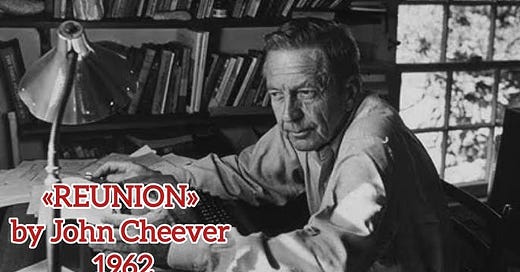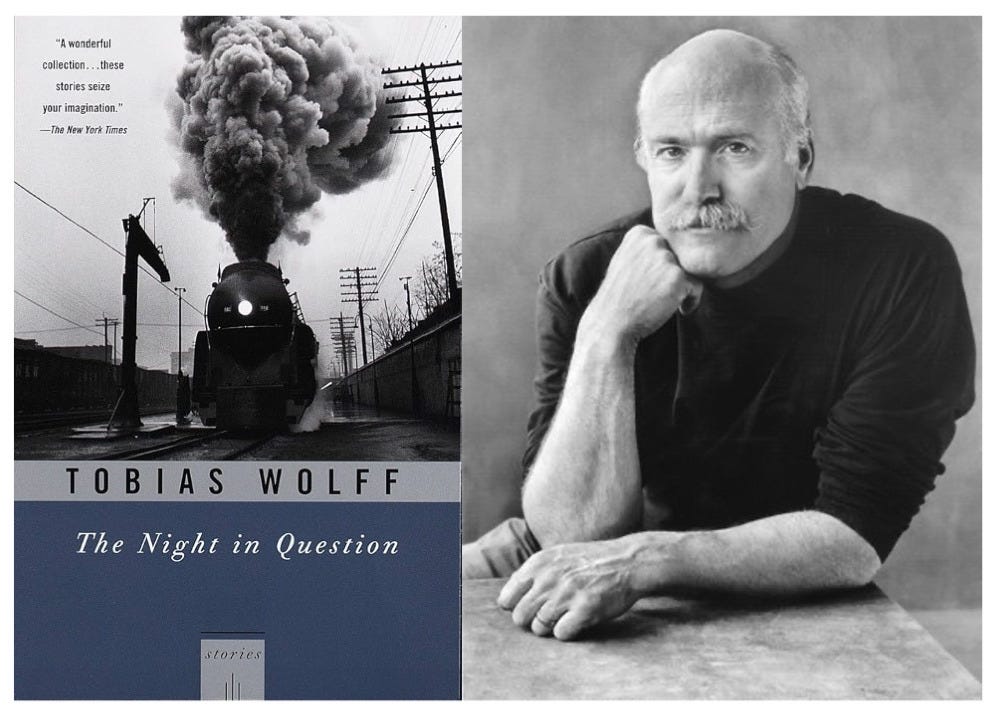I’ve read enough short stories this year that I’m recognizing a few common structural patterns. One I’m going to discuss today is the single-scene memory of a childhood incident in John Cheever’s “Reunion” and Tobias Wolff’s “Powder.”
These stories are short and recount one incident in the narrator’s past. They also happen to be dad-and-lad stories, a moment the male narrators had with their fathers that somehow defined the relationship and the direction of their lives.
I titled this post “the anecdotal story” to describe the genre. Technically, an anecdote recounts an incident, whereas a story tries to make meaning of the incident. “Reunion” and “Powder” are both stories in the sense that they seek to make sense out of something, but the reader is left to figure out what.
Cheever’s “Reunion”
This was the second story in the Granta anthology I’m going through, and it must be a favorite of editor Richard Ford’s, because you can listen to him read it here for The New Yorker (or read it yourself here).
The plot of the story is simple: a teenage boy in transit has a short stopover in Manhattan, so he goes out to lunch with his father. The father shows up smelling of whiskey and lacking a great plan. They cycle through a few restaurants over an hour, leaving either because the waiter won’t serve alcohol to the boy or getting kicked out for his father’s drunken belligerence. Finally, they run out of time for a meal, and the boy has to leave. That was the last time he saw his father.
So, what makes this a story and not a mere anecdote? The opening sentences offer a clue:
The last time I saw my father was in Grand Central Station. I was going from my grandmother’s in the Adirondacks to a cottage on the Cape that my mother had rented, and I wrote my father that I would be in New York between trains for an hour and a half, and asked if we could have lunch together. His secretary wrote to say that he would meet me at the information booth at noon, and at twelve o’clock sharp I saw him coming through the crowd.
From this, we can infer a few things: the parents are divorced, his mother has no interest in communicating with the father (the narrator writes the letter), and the father has outsourced communication to his secretary (a good clue as to why the marriage didn’t work out).
We don’t know how old the narrator is at the time of the telling, but presumably he is an adult looking back. This moment matters because, as it says in the first and last sentences, this is the last time he would see his father. The narrator doesn’t show animosity toward his father on the page, or offer any asides to complain about what a cad his father is, but it comes across clearly enough.
The narrator also doesn’t offer details about his life today — where he is, what his own family life is like, how his relationship with his mother is. Like an anecdote, we only get the incident of the afternoon, his father yelling at waiters and ordering “bibson geefeaters” (a drunken slur for Beefeater Gibson).
All we can infer is that, years later, the narrator is still thinking about that afternoon as a consequential moment in his life, perhaps a moment that defined something about him or his view of the world. The implication of consequence makes this a story.
Tobias Wolff’s “Powder”
Here’s another dad-and-lad story, this one with, arguably, a cheerier ending. Like “Reunion,” it’s only a couple of pages and well worth reading here. The last line is one of my favorites in contemporary American short fiction.
Wolff’s narrator is a teenage boy who is skiing with his father. His mother expects them home for dinner, but they get caught in a snowstorm. If they don’t make it home, the narrator suspects, this will be the final nail in the coffin of his parents’ marriage (they’re separated but maybe not permanently, not yet). Although the road out of the mountain is closed, the father moves a barricade and takes the dangerous path down. In a flash-forward, the narrator explains how the father will talk his way past some police at the other end of the closed road and make it home in time. This time.
The end.
So, what’s it all about? And what makes it a story rather than an anecdote? What gives it meaning?
As in Cheever, Wolff’s narrator is telling the story retrospectively from some point of wisdom in adulthood, when he’s had a chance to make sense of everything. Unlike the Cheever, the father in “Powder” is more likable. I don’t get the sense the narrator is estranged from him (though we know the parents’ breakup is now permanent).
We like the father here because he’s actively working to try to salvage his family. He may be irresponsible (in fact, he definitely is irresponsible), but his heart is in the right place. When a state trooper tells him the road is closed, he takes the son to a diner and makes a phone call. When he sees the trooper driving past with lights flashing, he knows the coast is clear and brings his son back to the road barricade.
Whereas the father’s life lesson in “Reunion” is, maybe, “I’m a selfish drunk and an unredeemable boor,” the life lesson in “Powder” is summed up in a few lines of dialogue. On the snowy mountain road, covered in fresh powder:
My father grunted thoughtfully and said, “Don’t ever try this yourself.”
“I won’t.”
“That’s what you say now, but someday you’ll get your license and then you’ll think you can do anything. Only you won’t be able to do this. You need, I don’t know—a certain instinct.”
“Maybe I have it.”
“You don’t. You have your strong points, sure, just not this. I only mention it because I don’t want you to get the idea this is something anybody can do. I’m a great driver. That’s not a virtue, okay? It’s just a fact, and one you should be aware of. Of course you have to give the old heap some credit too. There aren’t many cars I’d try this with. Listen!”
The father goes on to tell him, however, that he has many virtues, including his ability to think ahead. It’s a poignant moment of honesty, and now the narrator is thinking back, remembering how they made it home in time for dinner, “before my mother decided to make the split final.”
On the highway, however, he believed they would be caught by the police on the other end of the road closure, and with that certainty in mind, he enjoys the twists and turns. Get a load of this ending:
My father in his forty-eighth year, rumpled, kind, bankrupt of honor, flushed with certainty. He was a great driver. All persuasion, no coercion. Such subtlety at the wheel, such tactful pedalwork. I actually trusted him. And the best was yet to come—switchbacks and hairpins impossible to describe. Except maybe to say this: if you haven’t driven fresh powder, you haven’t driven.
This short story is anecdotal, in the sense that takes place over a short evening, essentially one extended scene, and could be read (or told) in a matter of minutes. But the telling is an act of trying to make some sense out of life, which is more than any of us can hope for from a story.





